|
The 1890s
I shall begin this page by making a mention of an
occasion that took place before 1890. Sunday,
22nd December, 1889, was Thomas’s 46th birthday and the occasion
was marked by an interesting ceremony that took place on the evening
of Saturday 21st, at the Drill Hall, Wolverhampton. The
employees of the Electric Construction Company, presented a framed
and illuminated address, together with a beautiful silver tea
service, as a mark of their esteem, to Thomas, their works manager.
|
Read a
description
of the presentation |
 |
By 1888 the Parkers were living at Newbridge
House, Tettenhall Road. It was on the corner of New Hampton Road
West and Tettenhall Road and their last two children, Walter Faraday
and Kelvin were born there.
|
|
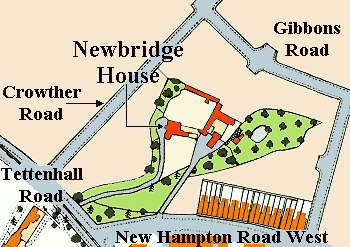
The location of Newbridge House.
|
In the edition of the Express & Star newspaper,
for the 12th March, 1890, is an article about a
painting that was commissioned by Thomas Parker. It states that
Mr. Thomas Parker of Newbridge House, had just lent a
magnificent picture of The Last Supper, by Edwin Goodwyn Lewis,
to the Wolverhampton Art Gallery. The
picture measures 4ft. 10” by 3ft. 2”, and the original sketch of
the subject, from which the painting was produced, had been
exhibited during the previous December in Mr. Lawson’s studio in
Darlington Street. |
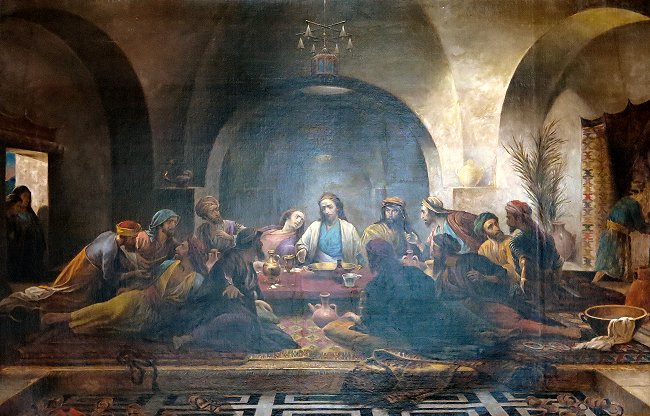
Thomas's painting of The Last Supper.
| Thomas used to attend the Wolverhampton Unitarian
Church on Snow Hill, as can be seen in the following article
from Thomas’s newspaper cuttings book. The article is undated
and the source is unknown:
Unitarian
Christian Church, Wolverhampton
At the invitation of Mr. Thomas Parker, of
Newbridge House, the choir of the above church were entertained
on New Year’s Eve, and spent a most enjoyable evening together.
After having partaken of refreshments, the organist (Mr. E.
Walker), on behalf of the choir, presented Mr. Parker with a
gold pencil case, in commemoration of his birthday, at the same
time tendering the thanks of the choir to Mr. Parker for his
many acts of kindness to them throughout the year. Mr. Parker,
in reply, thanked those present for their kind expressions
concerning him, at the same time urging the choir to still
greater diligence in their duties.
Another unnamed and undated newspaper cutting from
the Parker records, mentions that the Parker’s eldest daughter,
Lilly, married John J. Robins, an electrical engineer, in
Wolverhampton.
An article in the Midland Evening News from
Wednesday, 25th April, 1900, gives an idea of
Thomas’s reputation. The article is about a law case in
Birmingham, in which the plaintiff was attempting to recover
£2,000 commission from the defendant, who promised that he would
obtain Mr. Parker’s services for the construction of a tramway
for £2,000.
During the proceedings it was mentioned that the
famous physicist from the University of Glasgow, one of the most
distinguished scientists in the world, Lord Kelvin, described
Thomas Parker as “The Edison of Europe”.
There is a mention in the Birmingham Daily Gazette
of Wednesday, 9th May, 1900 about the governors of
the new University of Birmingham. Thomas is listed as a life
governor.
The Parker family listing in the 1891 census is
as follows:
| Newbridge House, Tettenhall Road |
| Thomas Parker born
in Coalbrookdale
|
| Jane Parker born
in Birmingham
|
| Children:
|
| Thomas Hugh born
in Coalbrookdale Electrical Engineer
|
| Charles Henry born
in Coalbrookdale Electrical Engineer
|
| Alfred Edward born
in Coalbrookdale Scholar
|
| Annie Diana born
in Coalbrookdale Scholar
|
| Jessie born in
Wolverhampton Scholar
|
In 1891 Thomas became a member of the Institution
of Mechanical Engineers and in 1892 he became a member of the Royal
Society of Edinburgh.
Thomas became a Wolverhampton J.P. in 1893, as
can be seen from the following family letters:
|
|
Town Clerk’s Office
Town Hall, Wolverhampton.
Horatio Brevitt, Town Clerk.
17th
February, 1893
Dear Sir,
I have much pleasure in informing you that the Lord Chancellor has
added your name to the Commission of the Peace for this Borough.
I will communicate with you in due course as to when and where you are
to qualify for the office.
Yours Truly
Horatio Brevitt
Town Clerk
T. Parker Esq., Newbridge,
Wolverhampton.
|
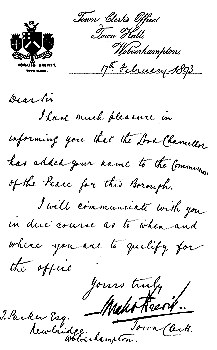 |
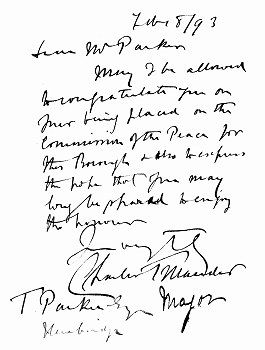 |
The Mount
Wolverhampton
18th
February, 1893
Dear Mr. Parker,
May I be allowed to congratulate you on
your being placed on the Commission of Peace for this Borough
and also to express the hope that you may long be pleased to
enjoy the honour.
Sincerely
Charles T. Mander
Mayor
T. Parker, Newbridge.
|
|
The swearing-in of the new magistrates, was
mentioned in the Express & Star on 20th February, 1893.
The article states that at noon on that day, the eight gentlemen
whose names had recently been added to the Commission of the Peace
for the borough, formally took the oaths of office in the Mayor’s
parlour at the Town Hall.
The Mayor, C.T. Mander Esq., was himself present,
and with him in addition to the other new magistrates were Messrs.
Charles Neve and Henry R. Denton, borough justices, the Town Clerk,
Mr. H. Brevitt, and Mr. E.H. Thorne, Clerk to the Borough Justices.
The Mayor then took the oath of allegiance to the Queen, as read by
the Town Clerk, and signed the roll, his signature being attested by
Messrs. Neve and Denton. Following him Messrs. James Saunders
(Deputy Mayor), S.T. Mander, B.F. Williams,
J.F. Beckett, T. Parker, T. Graham, and W.F. Mee took the same
oath.
The Mayor said that he hoped they would one and
all be blessed with health and strength for many years to come, to
fulfil the new duties which had been placed upon them that morning.
|
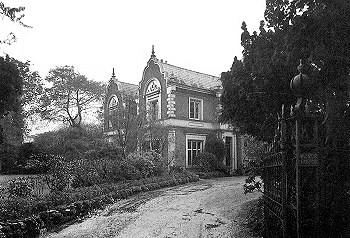 |
Sometime between February 1893 and June 1894,
the family moved house. Their new address was The Manor
House, Upper Green, Tettenhall.
The Manor House, Upper Green,
Tettenhall. |
| An advert for the sale
of the Manor House. |
 |
|
The Wellington Journal of
July 18th, 1896 includes the following article:
The Fletcher
Memorial Wesleyan Sunday School
A very pleasant afternoon and evening were spent
at Aston Hall, Shifnal, by the scholars and teachers from the
Fletcher Memorial Wesleyan Sunday School, on Saturday. The treat was
kindly given by Mr. Thomas Parker of Wolverhampton (late of
Coalbrookdale), formerly a scholar in the school. After a pleasant
drive the hall was reached and while the teachers prepared tea the
children enjoyed themselves in the grounds. After tea the children
sang some of their anniversary hymns and Mr. Parker gave a speech.
|
| The site of the Manor
House today. All that's left from the original site is the
low surrounding stone wall and the small wrought iron gate
and gate posts. The brass nameplate on the right-hand gate
post also appears to be original:

|
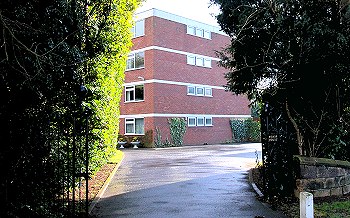 |
|
Thomas is mentioned in the Express & Star on 19th
September, 1896 in an article entitled “Mr. Thomas Parker as the
good Samaritan” The article states that Fanny Cotterhill of
Brickkiln Croft was charged with being drunk and disorderly on 14th
inst. in Bennett’s Fold. Police Constable Green gave evidence. It
transpired that the defendant came out of gaol on the same day.
A witness for the defence stated that the
defendant was not present at the time the alleged offence was
committed. Mr. T. Parker remarked that it appeared as if the police
wanted to crush the woman out of existence. Mr. Newnham, magistrate,
differed and said that the defendant would be fined 5s. and costs,
on the defendant promising to behave better in the future.
Mr. Parker paid 14s., the amount of the fine and
costs, remarking shortly afterwards that he was not going to sit on
the Bench to hunt people down to death.
Thomas read the above article in the newspaper,
and sent the following letter to the Editor:
Sir, I have noticed that your report and
criticism on my paying the fine for the woman Cotterill on Saturday
last in your paper has been echoed. It was not my intention to cast
any reflection on the Police Force of our borough, as I have a great
respect for that body, but to register my feelings on the system of
dealing with such cases. I am of the opinion that the treatment
meted out is not preventative, but degrades and brutalises, and has
the effect of irritating and driving people to despair, and thereby
increasing the trouble it is desired to remove.
I shall be glad if my act on that occasion may
lead to some effort being made to try some other means or method.
Too much weight is given to previous convictions, and conviction is
too easily obtained, so that the present system of prosecution
becomes little less than persecution.
I am, yours faithfully,
Thomas Parker, J.P.
Manor House
Tettenhall
Wolverhampton
22nd September, 1896.
An undated and unidentified newspaper
cutting in Thomas’s cuttings book, tells of
an unfortunate incident that took place at the Manor House:
A Wolverhampton J.P. fined
Mr. Thomas Parker, J.P. of Upper Green
Tettenhall, was summoned for having his chimney on fire on the night
of the 14th, at the Wolverhampton County Petty Sessions.
Sergeant Goode proved the case and said the flames were about a yard
over the top of the chimney. Alderman C.T. Mander who was presiding
said “We don’t want to waste our time over something like this” and
asked the magistrate’s clerk, Mr. Thorneycroft, the amount of the
usual fine. A fine of 2s 6d. was imposed along with costs. Mr.
Parker, who did not appear was represented by Mr. Copeland,
solicitor. The total fine and costs amounted to 11s. 6d.
|

Camille Jenatzy in his record breaking
car. Courtesy of Gail Tudor. |
On 29th April, 1899 Camille Jenatzy from
Belgium broke the world land speed record at Achères,
France, after reaching a speed of 65.79m.p.h. His car, the
"Jamais Contente" was the world's first electrically powered
racing car and was designed by Camille himself.
The photograph is from a Christmas card that was sent by
Thomas's daughter Jessie. Behind the car is Thomas Parker
and his son Alfred. Thomas is 7th from the right with the
flat-topped hat and Alfred is 2nd from the right.
The car still survives in the collection at the Compiegne
Museum in France. |
By the age of 16, Thomas and Jane’s daughter
Annie, was clearly an accomplished pianist. An
article in the Midland Evening News, on Saturday, 25th
April, 1896, describes the annual meeting of the Wolverhampton and
District Hospital for Women. It was held in the Exchange Hall on the
afternoon of April 24th. Lord Wrottesley presided, and before and
after the speeches, a concert was given, during which Miss Annie
Parker played two piano solos.
The Express & Star of 5th August, 1899
includes an article called "A New Enterprise At Wolverhampton". It
mentions that a new company was formed, to carry
on the business of manufacturing castings, forgings, and apparatus
for electric lighting, electric transmission of power, railways,
tramways and such other purposes as were recognised as being
advantageous to the company in connection with new developments and
improvements in general and electrical engineering.
The new enterprise was located at Wednesfield,
where existing electrical engineering works were purchased. These
works were situated on the bank of the Wyrley and Essington branch
of the Birmingham canal, in the midst of a coal and iron district,
and with a siding connected to the Midland Railway. The promoter of
the new company was Mr. J. Hardie McLean, Director and Engineer of
W. Lucy & Co. Ltd., and who was for over five years Managing
Engineer of the Oxford Electric Company. The capital of the company
was £30,000, and among the directors of the new concern were Mr.
Thomas Parker, director of Thomas Parker, Limited, Wolverhampton,
and Mr. McLean.

|
|

|
|

|
Return to
Australia |
|
Return to the beginning |
|
Proceed to
the E.C.C. |
|
|